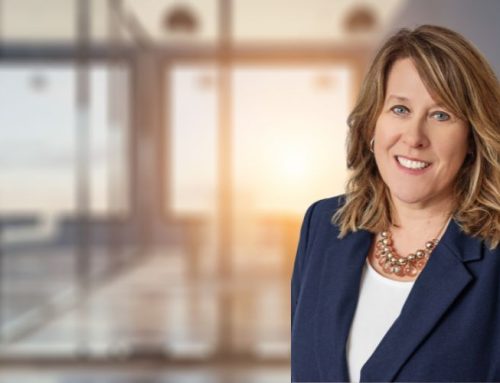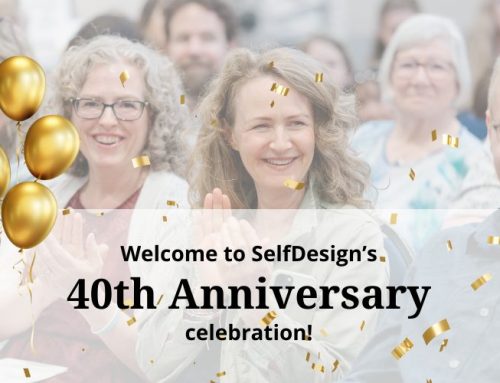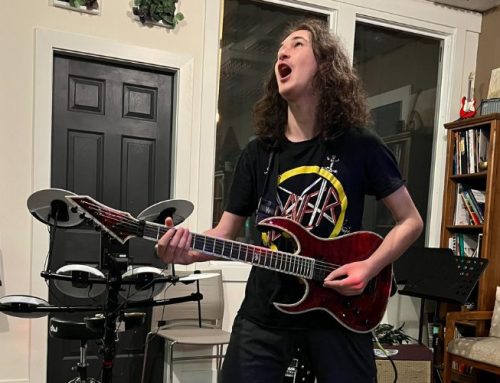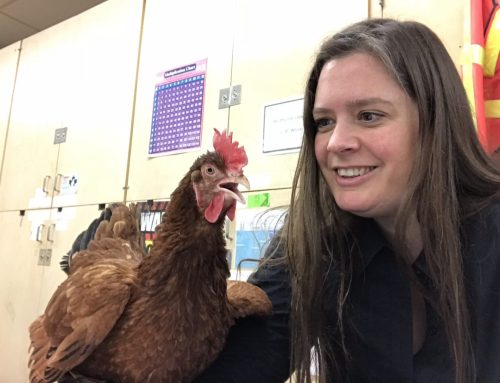A Q&A with our outgoing Director of Organizational Learning and Culture
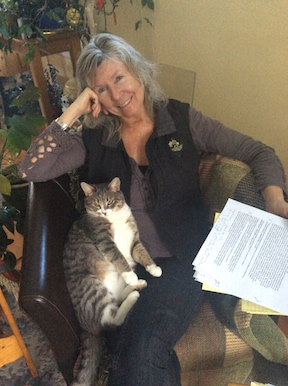 When River Meyer moved from Alaska to a small Colorado mountain town in 2003, she hadn’t heard of SelfDesign, Wondertree (SelfDesign Learning® Community’s predecessor), or Brent Cameron, SelfDesign’s founder. Yet, within the year, she met Brent and began rewriting the manuscript for his book, SelfDesign: Nurturing Genius Through Natural Learning, which would be published in 2006.
When River Meyer moved from Alaska to a small Colorado mountain town in 2003, she hadn’t heard of SelfDesign, Wondertree (SelfDesign Learning® Community’s predecessor), or Brent Cameron, SelfDesign’s founder. Yet, within the year, she met Brent and began rewriting the manuscript for his book, SelfDesign: Nurturing Genius Through Natural Learning, which would be published in 2006.
It was an immersive introduction to SelfDesign’s philosophy and approach to learning that has stood her well. She moved to British Columbia, and shortly after finishing the book, River joined SelfDesign’s Leadership team, where she supported SelfDesign parents, drawing on her own experiences as a SelfDesign parent, worked with Brent to advocate for SelfDesign and learner-centred learning, and created the SelfDesign Path course. Since 2017, as SelfDesign’s Director of Organizational Learning and Culture, she held the vision and philosophy of SelfDesign, sharing it with all SelfDesign contractors, learners and families.
“Many individuals strive to integrate SelfDesign’s philosophy, values and approach into their work and lives, but for River, as Director of Organizational Learning and Culture, that has been her purpose at SelfDesign during the last 6–7 years,” says President & CEO Amber Papou. “She has been a steady voice guiding us through changes and challenges, gently reminding us of why we do what we do the way we do it at SelfDesign, and keeping the organization true to its core values.”
Now, after 20 years helping to shape and support the SelfDesign community, River is stepping back from leadership to take on an advisory role and to work on special projects with SelfDesign. We sat down with her recently to talk about her own experiences with and thoughts about SelfDesign over the years.
The following conversation has been edited for clarity and length.
▶️ SelfDesign (SD): What was it about SelfDesign that spoke to you and brought you to work with the organization?
River: As a fairly young adult, I decided that I would do only work I felt passionate about and was really interested in. I’ve always liked to work hard at meaningful things that fit who I think I am. So imagine my surprise when I met Brent Cameron in 2003 and discovered that SelfDesign is all about living and learning in exactly the same way I believed, feeling passionate about whatever work I do and seeing myself as a lifelong learner, living life from the inside out versus the outside in — in other words, being at the centre of my own life and recognizing that others are at the centre of theirs, too.
I came to SelfDesign Learning Foundation in 2004, working with Brent to rewrite the very long manuscript he had created, trying to make his ideas more concise and understandable. Together we found a publisher, and the SelfDesign book was printed.
He asked me to join the leadership team at that time. And I’ve been on the leadership team ever since, working my way through many roles over the years.
▶️ SD: Tell us about some of those roles.
River: When I started with the leadership team, I held the role of parent advocate. I don’t believe that was an official title, but I worked directly with families in SelfDesign Learning Community who needed support, who wanted to understand what SelfDesign was about, or who had partners or extended family and friends that were having difficulty understanding the type of learning we encourage in our program.
In the original leadership group, we acted as a team instead of having separate roles. Whether there was a programmatic issue or a plan for a new initiative, we gathered together to work on it. It was a busy, positive group of people focused on forwarding the organization.
Throughout my time with SelfDesign, I’ve done several other things as well. I created documents and activities orienting families to SelfDesign, and I worked with learning consultants to support them. Brent and I went to conferences in Canada and the U.S. to present SelfDesign concepts. I was involved in the inception of several new initiatives.
During those years, Brent was trying to write an overall SelfDesign course, and I worked with him on that. But Brent was almost always focused on new creative projects – he would start many but rarely finish them. He was a bit like a comet, and often at the tail end of that comet you’d see me and a few other people, trying to finish and finalize where we could.
I finally decided I wanted to write something about SelfDesign and be able to complete it on my own. That’s when I created the Path to SelfDesign course for parents. We’ve seen that parents often feel initially challenged about our different way of looking at learning, and I wanted to create supports for them around that.
I wrote the original Path course in 2010 and then rewrote it in 2016. Various people joined me as facilitators of the course over time, and for the past several years, Marianne Butler has done a wonderful job in that role.
My most recent role with SelfDesign has been as director of Organizational Learning and Culture, which I’ve really enjoyed. It has allowed me to work with the passion I feel for SelfDesign and to focus on sharing aspects of the philosophy in different forms, creating and recreating models, writing courses, blog series and various documents, facilitating Community Conversations (organization-wide conversations about SelfDesign culture, philosophy, approach, opportunities and challenges), and working with educators and the leadership team to support the SelfDesign philosophy.
▶️ SD: Are there any specific projects you’ve been focused on in these last few years?
River: I’ve been organizing a lot of legacy materials that I’ve collected over the years, basically trying to centralize many documents, models and videos that Brent, Kathleen Forsythe (former Executive Director of SelfDesign® Learning Foundation and former Principal of SelfDesign Learning Community), Pille Bunnell (former Board member and leadership member) or I have done over the years so that contractors will be able to access them.
My foremost project of the past year is the creation of a course for our contractors on the philosophy of SelfDesign. It’s aimed toward how the philosophy can be applied throughout our organization, both in our personal and professional lives rather than only for our learners and their families.
The course is just being completed, and the goal is to have it be part of SelfDesign’s orientation package for contractors. If all contractors in SelfDesign Learning Foundation understand the SelfDesign philosophy at least to some degree, we create greater integrity in our organization, and that makes us a stronger, more cohesive group.
▶️ SD: What do you see have been some of the main challenges to the SelfDesign philosophy over the last 20 years?
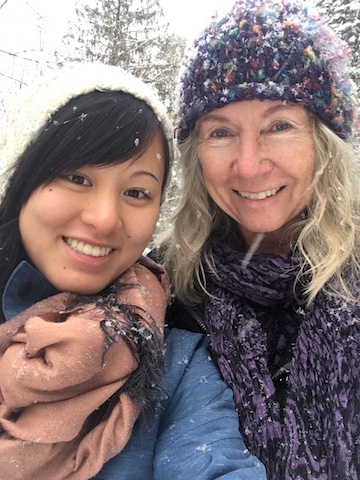 River: SelfDesign philosophy is quite revolutionary. It takes how society typically sees learning — with the teacher at the centre, directing learning — and turns it inside out to put the learner at the centre, directing the learning.
River: SelfDesign philosophy is quite revolutionary. It takes how society typically sees learning — with the teacher at the centre, directing learning — and turns it inside out to put the learner at the centre, directing the learning.
SelfDesign Learning Community, our Foundation’s main program, has come a very long way in working successfully with the BC Ministry. Over the years the Ministry has actually begun to incorporate some of our ideas into their programs – we are happy to see that, and yet I believe we will always maintain the uniqueness of our approach. We want to remain oriented to the heart and purpose of SelfDesign philosophy in all that we do.
And so, some of the work that I’ve done as Director of Organizational Learning and Culture has been to remind people, “Let’s regularly go back to our roots. Let’s talk about why we’re doing this work and what it’s really about.” Because our work is not about trying to fit into the Ministry system. Brent never intended SelfDesign to be something that would or even could be slotted into the conventional educational system. It was created to be a totally different way of looking at what learning is and how it happens.
We do meet Ministry requirements in our own unique way, and we happily receive provincial funding for our learners. We offer our learners the opportunity to complete their time with us in the same ways as in all B.C. schools — they can receive either a certificate of graduation, an adult diploma or a school completion certificate. Families can feel confident that their children will be ready and able to choose whatever future directions they desire.
I’m always encouraged to think that, with consistent awareness of our philosophy and approach to learning, we can balance the requirements of our Ministry while maintaining our uniqueness, and our learners can remain at centre and direct their own learning.
▶️ SD: What are some key learnings that you’ve experienced over your 20 years with SelfDesign?
River: I’ve had many learnings, but there are two I think of most immediately. One has been a confirmation of what I believe about life — that I can live an integrated,
passionate life that is truly designed by me as long as I am in positive relationship and conversation with others. Being curious, respectful and reflective keeps me in integrity with my inner being.
I appreciate that I’ve been able to be so engaged in my work, doing what I love to do in ways that support my basic beliefs about people and about myself.
I came into this experience with confidence that I could successfully and happily direct my own life, and the SelfDesign philosophy has really solidified that for me. And I see it happening in the lives of so many learners. I see it happening, too, in the lives of the many learning consultants who have embraced the philosophy.
The second key piece is my awareness that the more any of us understand this philosophy of living and learning, the more we have the opportunity to integrate it into our lives and to support other people’s learning.
We first need to bring the SelfDesign philosophy into our consciousness and then be intentional about using it. If we just automatically do things without understanding what it is we’re doing and how we’re doing it, we can’t be as effective.
And so I think having the philosophy be explicit and intentional in my own life has really helped me in the sense that I could say, “Yes, I see my strengths in this area and this area. And in this other area, I’m not seeing myself as strongly as I’d like to, so I’m going to put my attention here.”
This has been an important awareness for me, and it’s something that has felt quite powerful. I’ve been continually excited that I get to pay attention to personal growth within my work, and I hope that’s true for others as well.
▶️ SD: What’s next for River Meyer?
River: I will still be contributing to SelfDesign in an advisory role and on special projects. I’m not quite sure what that will look like, but I know it will be interesting and fulfilling. I’ll miss my role as Director of Organizational Learning and Culture, but I’m delighted to say that Nikki Kenyon, long-time learning consultant and former principal of SelfDesign Learning Community and Chief Learning Officer for SelfDesign Learning Foundation, will take on the role. I’m curious to see all that Nikki will do, and I’m confident that she will be an excellent support for SelfDesign as it evolves into the future.
I also look forward to discovering new and meaningful ways to contribute to society outside my SelfDesign work. I’m calling my stepping back a transition rather than a retirement, and I’m excited to see what will come next.
▶️ SelfDesign: All the best in those next adventures!
River: Thank you!


